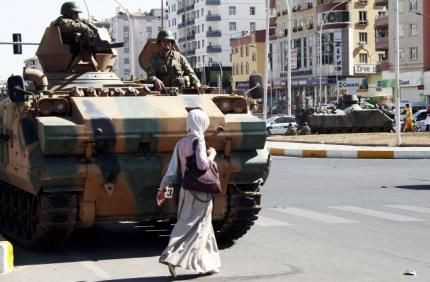Fight For Kobane May Have Created A New Alliance In Syria: Kurds And The Assad Regime

A video released Tuesday by Islamic State militants purportedly shows the group fighting not only Kurdish militants in Kobane, but also forces loyal to President Bashar Assad, signaling the presence of an alliance between the Kurds and the Syrian military not seen in the entirety of the 3-year-old civil war.
Until now, the only forces known to fight ISIS in Kobane were Kurdish fighters with the People's Protection Units, the militia known by its Kurdish acronym YPG, who are battling the Sunni militant group on the ground, and U.S.-led coalition forces, which are bombing the group from the air.
Following the start of the U.S.-led air campaign in Syria in September, Syrian regime warplanes have focused most of their attacks south of Aleppo in Idlib, and around Damascus. Coalition air forces are focusing on targeting ISIS strongholds in the northeast of the country -- a region that holds the majority of the country's oil fields -- and have created a de-facto no-fly zone over most of the region, limiting the Syrian Air Force to the west.
"The coalition's airstrikes have been effective the last few days. They hit ISIS tanks and artilleries," Redur Xilil, the spokesman for the YPG, told International Business Times. Kobane has been close to falling to ISIS for days, but on Wednesday coalition airstrikes slowed the militants' advance.
The Syrian Observatory for Human Rights, one of the few monitoring groups still operating within the country, has not confirmed the presence of Syrian regime forces in Kobane. But access to reliable information from inside the city is limited: Hundreds of thousands of people have left and fled to neighboring Turkey.
The group released a statement on its Facebook page Wednesday, saying that regime forces were involved in heavy fighting with Ahrar al-Sham, an opposition group not affiliated with ISIS, in Aleppo Province.
Although the Syrian regime is focusing on trying to take back Aleppo, the largest city in the country and the economic capital, it would also have reason to worry about areas around Kobane, known in Syria as Ayn al Arab, because it is on a road that leads to the country's biggest oil fields.
An alliance between Kurdish militants and the Assad regime would most likely come with a back room deal, possibly with the regime offering Kurds who live in Syria some degree of autonomy.
Kurdish militants seized several towns in the northeastern part of the country in the summer of 2012, when regime forces pulled out to fight rebels in Aleppo. Prior to that, the Syrian regime ruled those areas, and has historically discriminated against the Kurds, denying them any kind of autonomy.
But autonomy from Syria is not the YPG's first concern now. Building up a coalition to fend off ISIS and protecting Kobane, one of its only strongholds, is the priority. And whether or not it has formed an alliance with the Syrian regime, it still cannot defeat ISIS without more ground troops and ammunition.
On Monday, Turkish President Recep Tayyip Erdogan said that ground troops were needed to stop Kobane from falling, but said Turkish troops would not enter Syria to fight ISIS without the implementation of a buffer zone on the border and of a no-fly zone over Syria.
The U.S. has not accepted those terms yet. On Wednesday, Secretary of State John Kerry said that the international coalition would need to examine the pros and cons of implementing a buffer zone.
“The buffer zone... is an idea that’s out there, it’s worth examining, it’s worth looking at very, very closely,” Kerry told reporters, but did not offer any more details. "As horrific as it is to watch in real time what is happening in Kobane ... you have to step back and understand the strategic objective."
At a Pentagon briefing Wednesday, Rear Adm. John Kirby said American officials recognized it was "a possibility that Kobani could be taken." He said the U.S. was doing "everything we can from the air to try to halt the momentum of [the Islamic State] against that town, but that air power is not going to be alone enough to save that city."
Kurdish fighters in Kobane told the International Business Times that they would rather rely on the coalition sending them more arms and money than have Turkey send troops into Syria. They fear, they said, a prolonged military presence by their historical adversary in what is now a de-facto semi-autonomous Kurdish region.
"Turkey has been acting harsh toward our supporters in the [refugee] camps who want to cross and join the YPG fighting. Turkey is also not letting any food supplies pass through the border to our fighters," Xilil, the IPG spokesman, said.
© Copyright IBTimes 2024. All rights reserved.
Join the Discussion





















